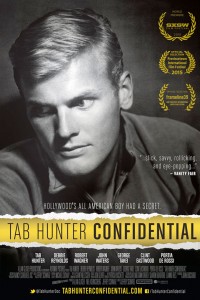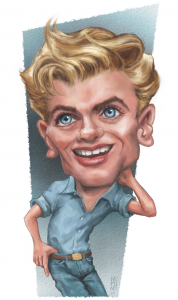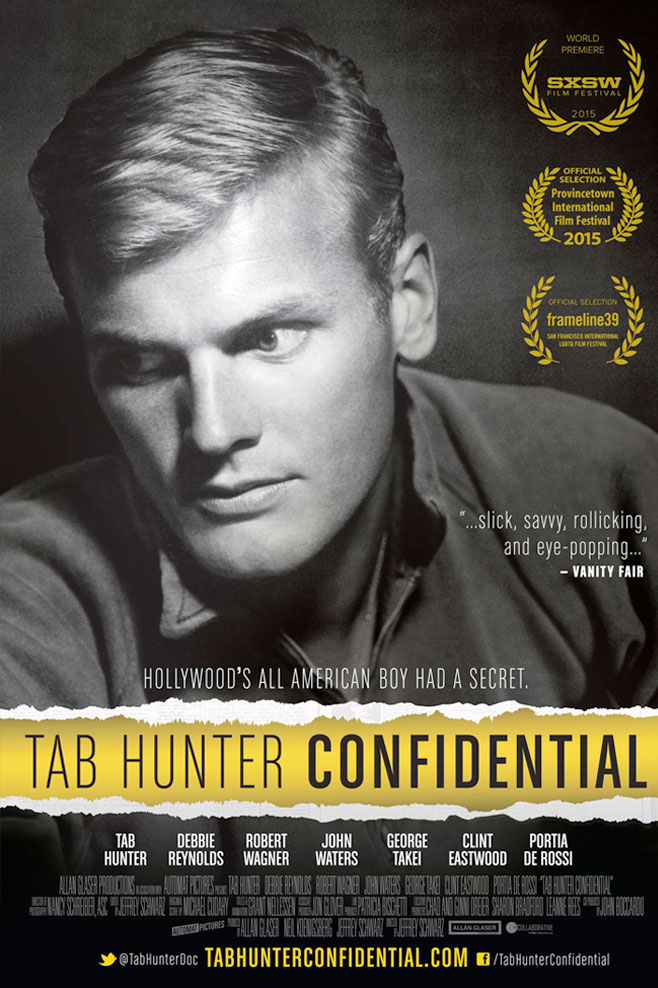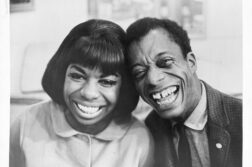 Tab Hunter Confidential
Tab Hunter Confidential
Directed by Jeffrey Schwarz
FilmRise
TEN YEARS AGO, I reviewed the memoir Tab Hunter Confidential in these pages, along with Robert Hofler’s book on talent agent Henry Willson, The Man Who Invented Rock Hudson. Both books tell the story of gay Hollywood in the middle of the 20th century: dark days, indeed. I liked both books, but I called Hunter’s a “tell-some,” as he was rather more circumspect about his sexuality than some readers may have liked.
A few months later, I had the pleasure of interviewing Mr. Hunter before an audience at the Santa Monica Public Library. To prepare for our conversation, I spent an afternoon with him and his longtime partner, Allan Glaser, at their lovely home in Montecito, near Santa Barbara. I found Hunter to be charming, contented with his life, and rather humble. He was also still quite handsome. After that visit, we were comfortable on stage together, though when I told him about my “tell-some” comment, he wasn’t willing to concede the point. He felt that he had told what needed to be told and was happy to let the book speak for itself.
Now, we have a documentary, directed by Jeffrey Schwarz (I Am Divine; Vito) and produced by Glaser, who is a wonderful custodian of Hunter’s reputation. I was glad to see that the film goes well beyond the memoir, telling much more. Schwarz had a great deal of access to Hunter and to many of his friends (all the way back to high school), colleagues, and costars like Debbie Reynolds, Dolores Hart (in full nun’s habit), and Robert Wagner. A female classmate recalls that young Art Gelien—Hunter was known by his mother’s last name rather than his father’s (Kelm)—was so attractive that the girls would chase him through the halls. Hunter confirms her story, saying that he would sometimes have to hide in an empty classroom to escape the marauders. It was a taste of what he was in for a few years later, when he was a full-fledged teen idol.
The film opens with a black-and-white clip from the quiz show I’ve Got a Secret. “Hello, I’m Tab Hunter, and  I’ve got a secret.” Did he ever—but of course the audience wasn’t going to hear about that secret on 1950s TV. Nevertheless, Hunter’s big secret was already in the public record by October of 1950, when nineteen-year-old Art was a guest at an all-male pajama party that was busted by L.A.’s infamous Vice Squad. Hunter briefly recounts that story in the film, and he says that he never thought the incident would come back to haunt him. It did, probably leaked by Willson to distract Confidential magazine away from rumors about Rock Hudson. Hunter was sacrificed for Willson’s major star and breadwinner.
I’ve got a secret.” Did he ever—but of course the audience wasn’t going to hear about that secret on 1950s TV. Nevertheless, Hunter’s big secret was already in the public record by October of 1950, when nineteen-year-old Art was a guest at an all-male pajama party that was busted by L.A.’s infamous Vice Squad. Hunter briefly recounts that story in the film, and he says that he never thought the incident would come back to haunt him. It did, probably leaked by Willson to distract Confidential magazine away from rumors about Rock Hudson. Hunter was sacrificed for Willson’s major star and breadwinner.
Hunter is a good interview subject. Having written his memoirs, his stories are fresh in his mind and clear. His voice is assured, and his emotional depth comes through poignantly. We learn that young Art had a difficult childhood: an abusive father; a divorced mother, which was nearly unheard of in the 1940s; and peer rejection. “I was extremely shy. … I did feel I was different from other boys.” And he got called the usual “fairy” and “queer” epithets. He says bluntly: “I hated myself.”
As a teenager, he developed a love for horses, a passion that he still indulges. He tells the story of being mentored by Dick Clayton, an actor turned agent, who, unlike Willson, never tried to make moves on the young man. Clayton helped Art get into the movie business and introduced him to Willson, who invented “Tab Hunter.”
Robert Wagner speaks candidly about Hunter’s good looks and his friendship with Natalie Wood. He wonders whether Hunter’s looks may have hurt his career by keeping him from being taken seriously as an actor. And gorgeous he was: the documentary contains many breathtaking photos and clips. He was the all-American California boy: tall, blond, with an open smile. He was also guileless and maybe a little naïve, unlike his famous lover, the mercurial Anthony Perkins, who was rather manipulative and calculating in his dealings with others, including Tab. But theirs was a real love under almost impossible circumstances.
Hollywood in the ’50s is the backdrop for Hunter’s story. Jack Warner signed him on in the mid-1950s, and he had several leading roles in hit films, most famously in Battle Cry (1955). It was fun telling him when we did the interview that my mom saw the film seven times as a high school senior—turns out we have the same taste in men! Being a contract player frustrated most stars, but Tab Hunter was a special case. He was offered a record deal and scored a huge hit with “Young Love” in 1956. Jack Warner was enraged: “I own you!” So, Warner Bros. Records was born, with Hunter as its first artist. Drawing on his choir boy experience, he had many hit records over the next several years and became a 1950s superstar.
Hunter grew so frustrated with Warner that he bought out his contract in 1962 for $100,000, which would be well over a million dollars today. He wanted his independence, an impulse that would define the next fifty years of his life. He went out on his own, unashamed to do bad TV and dinner theater in order to pay the bills. He just wanted to work, to make money needed for his mother’s care, and to live as quietly as he could.
Hunter’s midlife career break came from a rather unexpected source, gay icon John Waters, who gave him a part in Polyester (1981). The cult classic revived Hunter’s career and led to a second project with Divine (and Lainie Kazan, who tells the story of how much she loved kissing Hunter), Lust in the Dust (1985), which Hunter made in partnership with his new lover, Allan Glaser—who was a twenty-something junior executive at Paramount until Hunter lured him away, personally and professionally. The two men’s longtime love affair comes through sweetly in their shared scenes in the documentary.
Tab Hunter was not a great actor, but he was the quintessential movie star of his era. His homosexuality would undoubtedly have precluded a long career as a leading man (Rock Hudson notwithstanding), but that wasn’t really his ambition. This engaging documentary, now available on DVD, shows a man who is content in old age, living the life he has chosen. Tab Hunter Confidential tells a story of social significance and perseverance; it supplements the memoir of a decade ago. The film allows Hunter the last word in his own story: “I love where I am now in my life. I’m happy to be forgotten.”
Chris Freeman, a longtime contributor to these pages, teaches English and gender studies at the University of Southern California.






